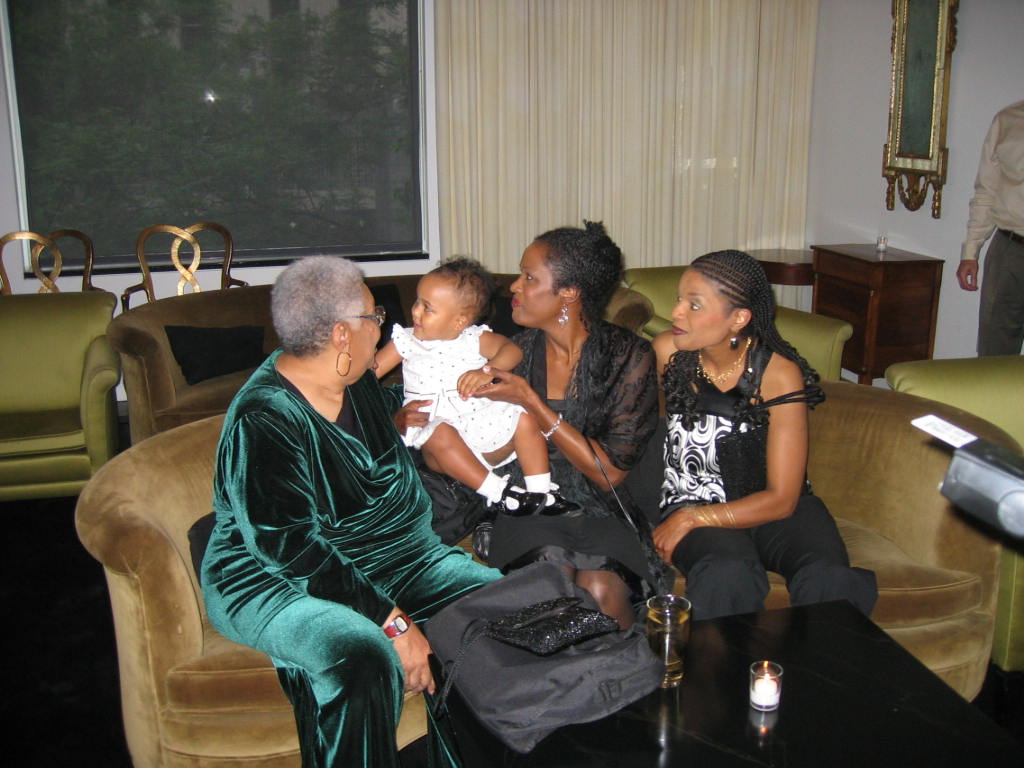 Lucille, daughters, and granddaughter
Lucille, daughters, and granddaughter
On Saturday night St. Mary’s College held a memorial service for Lucille Clifton, the noted American poet who was also our teacher, colleague and friend for almost twenty years. For me, the most moving part of the ceremony was hearing Lucille’s remaining three daughters reading their favorite poems. Or rather, they chose the poems that seemed most important to them at that moment. All poems were all from Lucille’s 1980 book two-headed woman.
Lucille defined herself as much a mother as a poet, and what I saw in these selections were life supports that her daughters, all born in the 1970’s, were now using to sustain themselves through their grief. The poems would have been written in those pauses between Lucille attending to them and their other three siblings. (That is why her poems were always short, she said multiple times.) Each poem indicates the daughter’s special connection with her mother.
Sidney, the oldest, chose “i was born with twelve fingers.” (You can watch Lucille reading this poem here. ) As the poem indicates, Sidney, like Lucille, was born with 12 fingers. The poem shows an on-going line of powerful women. In certain African and Pacific island cultures, having extra fingers is a sign of royalty. Here it is:
i was born with twelve fingers
like my mother and my daughter.
each of us
born wearing strange black gloves
extra baby fingers hanging over the sides of our cribs and
dipping into the milk.
somebody was afraid we would learn to cast spells
and our wonders were cut off
but they didn’t understand
the powerful memory of ghosts. Now
we take what we want
with invisible fingers
and we connect
my dead mother my live daughter and me
through our terrible shadowy hands.
I hear Lucille saying, “We’re feisty women, connected by shadowy ties, and you can’t keep us down.” This must be particularly reassuring to Sidney in this season of grief.
Gillian, who runs a physical fitness center, connects to her mother through their bodies. “homage to my hips” is about women’s self-confidence, and I imagine Gillian thanking her mother for giving her the strength to continue on:
these hips are big hips
they need space to
move around in.
they don’t fit into little
petty places. these hips
are free hips.
they don’t like to be held back.
these hips have never been enslaved,
they go where they want to go
they do what they want to do.
these hips are mighty hips.
these hips are magic hips.
i have known them
to put a spell on a man and
spin him like a top!
Alex, meanwhile, chose a poem with a date that has special significance. Lucille died on the same day, February 13, that her mother did. The poem might capture Alex’s sense of life seeming to turn grey without her mother—and also comfort her with the thought that she can continue to use Lucille as a protective shield. This youngest daughter must become a woman now, just as her mother had to “put on a dress called woman.” Needing to grow up doesn’t mean that Alex needs to grow away from Lucille, however. She knows this because of the way Lucille lived with the presence of her mother:
twenty-one years of my life you have been
the lost color in my eye. my secret blindness,
all my seeings turned grey with your going.
mother, i have worn your name like a shield.
it has torn but protected me all these years,
now even your absence comes of age.
i put on a dress called woman for this day
but i am not grown away from you
whatever i say.
On the memorial service program, underneath the daughters’ names, the following words appeared:
And the line goes on. “Don’t you worry, mister, don’t you worry.
The reference is to Lucille’s work generations, which is an account of her family history. The speaker is her great great grandmother Caroline, born a slave in 1823. The “mister” is her father who, as a boy became frustrated that Caroline wouldn’t tell him her African name. When he said that it would be forgotten, Caroline replied, “Don’t you worry, mister, don’t you worry.”
Names sometimes get forgotten but the line goes on. Especially when one generation passes along such gifts to the next.
Added notes: If you’d like to read more posts on Lucille Clifton, click on “Lucille Clifton” in the tag cloud. Also, since writing this post, I have also found the following two poems about Lucille’s daughters that emphasize the sense of continuity I have been talking about. The first is from Ordinary Woman (1974), the second from Two-Headed Woman (1980):
last note to my girls
(for sid, rica, gilly and neen)
my girls my girls
my almost me
mellowed in a brown bag
held tight and straining
at the top
like a good lunch
until the bag urned weak and wet
and burst in our honeymoon rooms.
we wiped the mess and
dressed you in our name and
here you are
my girls
my girls
forty quick fingers
reaching for the door.
i command you to be
good runners
to go with grace
go well in the dark and
make for high ground
my dearest girls
my girls
my more than me.
lucy and her girls
lucy is the ocean
extended by
her girls
are the river
fed by
lucy
is the sun
reflected through
her girls
are the moon
lighted by
lucy
is the history of
her girls
are the place where
lucy
was going

